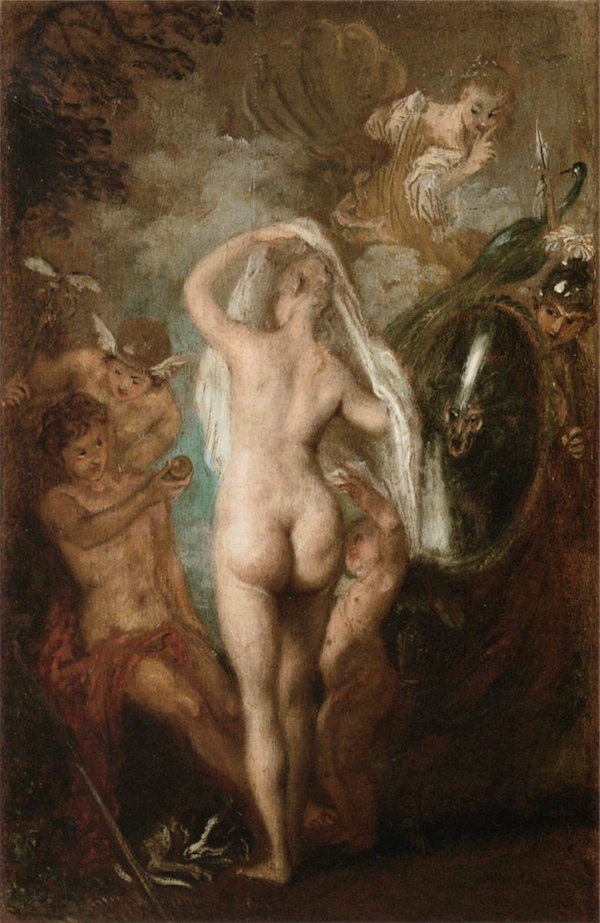
la folie. Formons les plus brillants concerts ;
Quand Jupiter porte les fers
De l’incomparable Platée,
Je veux que les transports de son âme enchantée,
S’expriment par mes chants divers.
Admirez tout mon art célèbre.
Faisons d’un image funèbre
Une allégresse par mes chants.
Aux langueurs d’Apollon, Daphné se refusa :
L’Amour sur son tombeau,
Eteignit son flambeau,
La métamorphosa.
C’est ainsi que l’Amour de tout temps s’est vengé :
Que l’Amour est cruel, quand il est outragé !
Aux langueurs d’Apollon, Daphné se refusa :
L’Amour sur son tombeau,
Eteignit son flambeau,
La métamorphosa.
le chœur.
Honneur, honneur à la Folie,
Elle surpasse Polymnie ;
Honneur à ses divins accents.
la folie.
Jugez par du beau simple & des sons plus touchants,
Si je connais la mélodie.
Ecoutez bien… surtout ma symphonie.
Que les plaisirs les plus aimables
S’empressent à l’envi de seconder l’amour :
Jeux & ris qui formez sa Cour,
En égayant ses feux, vous les rendrez durables.
Sans cesse accompagnez nos pas,
Plaisirs badins, c’est dans vos bras
Que notre ardeur se renouvelle.
Si Zéphyr ne badinait pas,
Flore lui serait moins fidèle.
Vous, Vous admirez mon art suprême,
J’attriste l’allégresse même,
Par mes sons plaintifs & dolents.
le chœur.
Honneur, honneur à la Folie,
Elle surpasse Polymnie ;
Honneur à ses divins accents.
la folie.
Je veux finir
Par un coup de génie.
Secondez-moi, je sens que je puis parvenir
Au chef-d’œuvre de l’harmonie.
Hymen, hymen, l’Amour t’appelle
Prépare à Jupiter une chaîne nouvelle,
Viens couronner la nouvelle Junon.
folly. Let us make the most brilliant music;
When Jupiter lies in chains
Made by the incomparable Plataea,
It is my will that the raptures of his bewitched heart
Be expressed in these my diverse songs.
Admire my celebrated art.
Let us make of a funereal scene
One of joy by virtue of my songs.
Apollo is taken with love for Daphne,
Who refuses him:
Love lying on her tomb
Extinguishes the flame
And thus transformed her.
chorus. Render honor, honor unto Folly,
She outdoes even Polyhymnia,
Honor to her divine music.
folly. Judge by my simplicity and sounds most pathetic,
How well I know the melody.
Listen well… to my whole symphony.
What hastening there is by the most wonderful pleasures
To fly in support of Love:
You games and laughter who compose her Court,
By lending laughter to love, you make her endure.
Never should you walk alongside our steps,
Careless pleasure, it is within your arms
That our flames burn anew.
If Zephyr does not tease,
You would be less faithful to him.
You admire the supremacy of my art,
I turn joy even into sadness
By my sad and mournful song.
chorus. Render honor, honor unto Folly,
She outdoes even Polyhymnia,
Honor to her divine music.
folly. Let me conclude
With a stroke of genius.
Help me, I feel that I can reach
A great perfection of harmony.
Marriage, love summons you,
Prepare for Jupiter yet another union,
Come and crown his new Juno.
—Jacques Autreau/Adrien-Joseph Le Valois d’Orville, Platée (1745)
Imagine this setting: the king of France is wedding his son and heir to the Spanish infanta, a woman notorious for her homely looks. To mark the occasion, the composer Rameau will premier a comic opera drawn from a tale of antiquity. It revolves around Plataea, a hideous creature (a nymph with the aspect of a frog) who has also fooled Jupiter, the king of the gods, into marrying her. In the end the ruse is exposed and Jupiter returns to the arms of his queen, Juno. The work is performed at the celebration of the marriage in 1745. So what happens? Is the marriage upended? Does Spain break off its French alliance? Is Rameau thrown in prison? Amazingly, no. The work is perhaps the greatest operatic success of the first half of the 18th century. Rameau is hailed as a genius, and the audience finds the work hysterically funny. “Un ouvrage sublime,” wrote Melchior Grimm. Baroque comic opera, at this point almost unknown, is born. But is that a laugh, or is it a crack in the façade of French monarchical absolutism? Comedy is, of course, notoriously culturally specific. But Platée manages, even today, to win over audiences with its wild and wily humor. Platée might in fact be subtitled “the birth of comedy from the spirit of music.” Platée was a significant innovation in almost every way—the music bristling with playfulness and chromatic dexterity; the characters mocking and mocked; the orchestra engaged into the work in a way not seen up to that point. The work owed its concept to a curious comic poet, Jacques Autreau, at that point an octogenarian known for a dour spirit whose poetry nevertheless kept its audience in stitches. But Le Valois d’Orville made a libretto out of it, and appears also to have improvised the Folly aria set above, creating a vehicle to better develop the comic possibilities of the text. Rameau seized upon it quickly, sensing the work’s potential. Some see in Platée the rise of ridicule, that at least somewhat malicious trait that came to dominate the French court down to the time of the Revolution. But the element of malice in Platée is not so apparent. Rather, the work seeks to have good fun with everyone, and no one is exempt–not the frog princess, the various humans, nor even the Olympians. It points to the fundamental humanity of all and reminds us that when the gods were more human, the humans were more divine.
Listen to a performance by the Musiciens du Louvre under the direction of Marc Minkowski of the La Folie aria in a bravura performance by the soprano Mireille Delunsch. The passage quoted begins just before the 1:45 mark in this recording.


